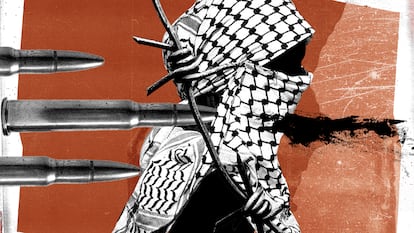‘Haaretz,’ the newspaper that defends Palestinians’ rights and resists attacks on Israeli democracy
Even in these days of great suffering, the newspaper’s editorials haven’t stopped holding Netanyahu responsible for what has happened

Manuel Chaves Nogales (1897-1944) would have been very happy to work at the Israeli newspaper Haaretz. He was always a fiercely independent journalist, whose criticism acquired all its value because it didn’t coincide with the majority sentiment of the moment (the Spanish Civil War) and because his gaze never turned away when he encountered the cruelty and obstinacy of human beings.
Chaves died young, without his profession ever having paid him the tribute he deserved. But today, we all have ample time to pay tribute to the extraordinary work carried out by the editors, contributors and directors of Haaretz. The Israeli newspaper has been defending the human and civil rights of Palestinians and Israelis for years, without looking away for a moment from the cruelty and stubbornness of the rulers. Even now — in these days of great suffering — those responsible for Haaretz don’t waver, as they continue to demand that the Israeli government put an end to the humanitarian crisis it is causing in Gaza.
For the past 28 weeks, the editorial team had been supporting the thousands of Israeli protesters, who have been demonstrating against Benjamin Netanyahu’s government and its attempt to suppress the Supreme Court’s right to examine the rationality of executive actions. “The appointment of Ben Gvir as minister of national security,” stated a recent editorial, “is enough to lead to the conclusion that the lives of Arab citizens are worth nothing to Netanyahu.” Turning Israel into a theocratic state, Haaretz argued — in which no one but the Jews can claim rights — condemns its two million Arab inhabitants to misery and distances any hope of negotiation with the Palestinians in the Occupied Territories.
The attack carried out by Hamas last week — with its high number of civilian victims — has not weakened the Israeli newspaper’s criticism, despite the anguish suffered by its journalists. Its first editorial following the operation began like this: “The disaster that befell Israel on the holiday of Simchat Torah is the clear responsibility of one person: Benjamin Netanyahu. The prime minister, who has prided himself on his vast political experience and irreplaceable wisdom in security matters, completely failed to identify the dangers he was consciously leading Israel into when establishing a government of annexation and dispossession, when appointing Bezalel Smotrich and Itamar Ben-Gvir [both settlers previously convicted of supporting terrorist groups] to key positions, while embracing a foreign policy that openly ignored the existence and rights of Palestinians.”
Haaretz has opened a debate on several occasions about one of the great problems raised by the analysis of the Palestinian-Israeli conflict. Does international law recognize the Palestinians’ right to resistance? And by what means? Obviously, terrorism — whose fundamental objective is to cause civilian casualties — can never be one of them. Hamas practices it, without a doubt. But is armed resistance legal against an army that, less than 50 years ago, occupied a territory by force, an occupation that has been rejected by the United Nations?
Some Haaretz contributors have explained that, if the Palestinians are denied the possibility of peacefully obtaining a state and denied respect for their human and civil rights in a possible binational state, they cannot be required to renounce their right to freedom. Resistance is legitimate, as long as it doesn’t include terrorism. That’s why it’s so important that all types of protest actions aren’t classified as such, as many NGOs denounce the actions of the Israelis today. If everything is classified as “terrorism” — and not exclusively “the intentional harm to innocent people by a non-state actor,” according to the accepted definition (a strange one, written by American diplomat Richard Haas, which leaves out the intentional harm to civilians caused by a state) — the concept and condemnation of the concept weaken and disappear.
The Achilles heel of the West on the international level has always been the accusation that it practices double standards. Chaves Nogales would tell us that Israel has the right to defend itself, but not to systematically and intentionally bomb civilians. He would also say, while Palestine shouldn’t fall into terrorism, Palestinians should be able to organize their resistance.
And, since he would be on the ground, in Gaza, he would write that the important thing now is to save the wounded — who are now crowded into Palestinian hospitals, without water or electricity — and prevent the hostages from being killed. Perhaps he would quote Shakespeare: “Hell is empty and all the devils are here.”
Sign up for our weekly newsletter to get more English-language news coverage from EL PAÍS USA Edition
Tu suscripción se está usando en otro dispositivo
¿Quieres añadir otro usuario a tu suscripción?
Si continúas leyendo en este dispositivo, no se podrá leer en el otro.
FlechaTu suscripción se está usando en otro dispositivo y solo puedes acceder a EL PAÍS desde un dispositivo a la vez.
Si quieres compartir tu cuenta, cambia tu suscripción a la modalidad Premium, así podrás añadir otro usuario. Cada uno accederá con su propia cuenta de email, lo que os permitirá personalizar vuestra experiencia en EL PAÍS.
¿Tienes una suscripción de empresa? Accede aquí para contratar más cuentas.
En el caso de no saber quién está usando tu cuenta, te recomendamos cambiar tu contraseña aquí.
Si decides continuar compartiendo tu cuenta, este mensaje se mostrará en tu dispositivo y en el de la otra persona que está usando tu cuenta de forma indefinida, afectando a tu experiencia de lectura. Puedes consultar aquí los términos y condiciones de la suscripción digital.









































